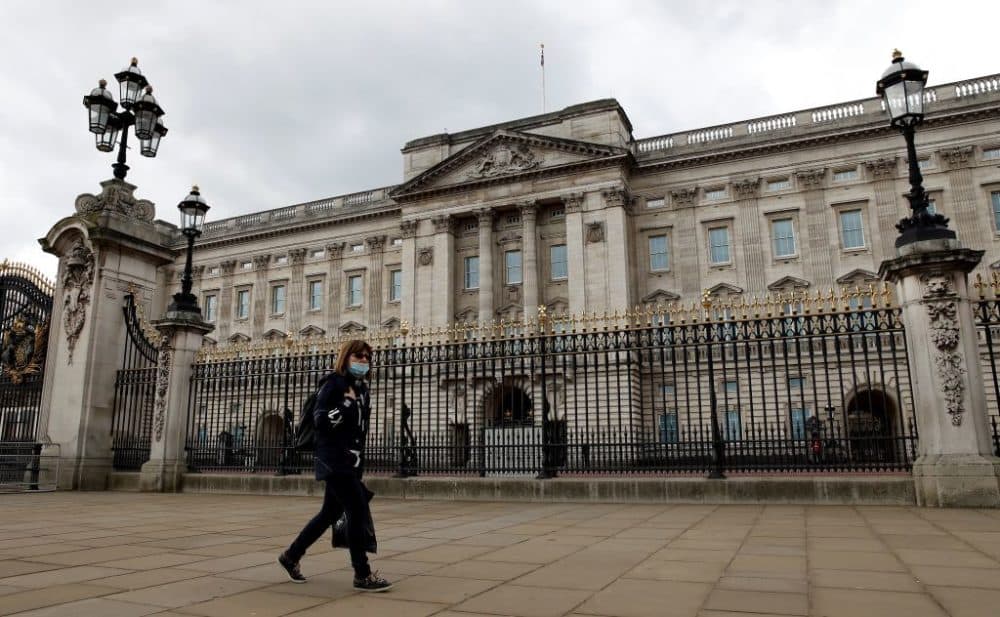Advertisement
'We've Turned A Corner': British Ambassador On UK Coronavirus Recovery

COVID-19 has killed more than 44,000 people in the United Kingdom — the highest death toll in Europe.
Karen Pierce, U.K.’s ambassador to the United States, says the situation on the island nation is getting better.
“I think we’ve turned a corner,” Pierce says. “We have a number of tests that the government makes to see if we can start opening up. We've met these tests.”
The British government has been sharply criticized for its response to the pandemic. “We perhaps didn't go into lockdown soon enough,” she acknowledges.
But the shutdown is beginning to loosen and Brexit is on the horizon. The U.K. has pledged to formally leave the European Union by the end of the year, and negotiators still haven’t agreed on the terms of the economic divorce.
“It has been possible to do a fair amount virtually,” she says. “So there's no reason to think the timetable can't be adhered to.”
Interview Highlights
On whether the coronavirus in the U.K. is worsening
“I think we've turned a corner. .. So from Fourth of July, what we called Independence Day, we relaxed some of the meeting restrictions. So certain events, leisure facilities, tourist attractions, playgrounds, parks, et cetera, they can open as long as they have good social distancing protocols. Pubs can open likewise. So we're getting back to normal. We can open places of worship for prayer and services with a maximum of people. And we have plans to get the schools back in September. So we think we're on track. We're not complacent. And there are provisions to go into specific lockdowns. Leicester, the city of Leicester, is one example, if the virus looks like resurging.”
On the U.K. being hit hardest by COVID-19 out of all European countries, and whether Prime Minister Boris Johnson is to blame
“Well, as you know, the prime minister actually caught COVID-19 and a very, very bad bout of it requiring his admission to intensive care in hospital. Perhaps I can just take the opportunity to say he was very grateful for all the good wishes he received from Americans at that time. So I think he's got real firsthand experience of how bad this disease is.
Advertisement
“When looking into why we have had a relatively sharp dose of it, I think there are various factors. Some of them, I think, around the fact that British traditionally travel abroad quite a lot, including in the winter months. But we're looking into what the causes might be. I think we've said before we didn't get a grip of testing soon enough. And we perhaps didn't go into lockdown soon enough, although there were pros and cons of doing that. But the important thing is that, you know, we're trying to learn those lessons, trying to learn from other countries, and we think we are now on track going forward.”
On whether Brexit will happen by the end of the year as planned
“We use Brexit as an event that has already happened, say the U.K. has left the European Union and now we are in what's called the transition period. There's no reason why it can't happen. Let me put it that way. If both sides want to make progress, we can find a way through and we can get it done by the end of the year. The prime minister's been crystal clear he won't be seeking an extension to this part of the talks. And this isn't about leaving the European Union. These talks are about the nature and scope of the future relationship, notably in trade between the U.K. and the EU.”
On how Brexit negotiations have been complicated by COVID-19
“I think it would be silly to pretend it hadn't been made harder by the fact that people can't travel and government time anywhere has had to be taken up with combating the virus. But the talks have gone on throughout the period of the virus. I think David Frost himself actually had COVID-19, but he has kept up the talks with Michel Barnier. They haven't been able to meet face to face as much as they otherwise would have done, although as we know from [Tuesday] night's dinner, that's changing.
“… But it does depend on political will and it does depend on our, as Brits, being able to get the same sorts of measures that our colleagues over in Canada and elsewhere have been able to get.”
On her reaction U.S. Immigration and Customs Enforcement denying visas to international students
“Well, obviously, we have a lot of concerned students and we have a lot of concerned parents of students. So this is something we're looking into with the administration and trying to get more detail on how exactly this will work. I mean, as we all know, because of COVID-19 originally, a number of students right the way round the world had to leave their universities if they were abroad and go home. But we need to look into this and see how best we can help the students. And we're doing that now.”
Alex Ashlock produced and edited this interview for broadcast with Todd Mundt. James Perkins Mastromarino adapted it for the web.
This segment aired on July 8, 2020.
